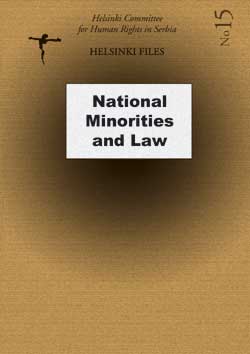ANALYSIS OF LEGAL REGULATIONS
ANALYSIS OF LEGAL REGULATIONS
Author(s): Author Not Specified
Subject(s): International Law, Human Rights and Humanitarian Law, Inter-Ethnic Relations, Ethnic Minorities Studies
Published by: Helsinški odbor za ljudska prava u Srbiji
Keywords: Serbia; legal regulations; analysis; ethnicity; national minorities; human rights; international law; FRY;
Summary/Abstract: A large number of countries are becoming increasingly concerned over the issue of the national minorities rights and so is the international community. However, before the WWII human rights and freedoms and their protection were a province under an exclusive jurisdiction of states. Citizens enjoyed only those rights and freedoms bestowed on them by a ruler through the internal legal order and state laws. But such a system was faulty and insufficient, for it was amply manifest that some states in that way legitimised the racial, national, religious and ideological discrimination. Rights of national minorities are today a regular part of the catalogue of fundamental human rights and freedoms enshrined in the most important international charters and acts. Considering a large number of international laws dealing with the rights of national minorities, that issue is no longer within an exclusive competence of states. It has in fact become the subject of international-legal and political obligations of state and the one of universal and regional organisations. Basic preconditions for the exercise of fundamental human rights and freedoms and accordingly of national minorities rights are the existence of the legal state-the rule of love and ethnic tolerance. Without those preconditions one could hardly talk about the genuine existence, exercise and protection of human rights. The gist of protection of national minorities is the principle of banned discrimination on any grounds, the principle of equality of all before the law and existence of special measures ensuring the preservation of national, cultural, religious and linguistic identity of ethnic minorities. On the other hand the following issue is raised: how to ensure every citizen's right to preservation of his/her identity, culture, language and religion without reducing the stability of a community as a whole, and its sovereignty and territorial integrity, how to find a magical formula, a universal model applicable to all states. But the history has shown that such a magical formula did not exist. Each state facing the issue of relations between the majority and minority people had to build a specific model of their cohabitation, the one conditioned by historical legacy and current international circumstances. National legislation plays an important role in guaranteeing cultural, religious, ethnic, linguistic, national and other rights to national minorities through determination of those rights and providing guarantees for their exercise and protection. Regardless of a breadth and richness of a spectrum of national minorities' rights in a state, its existence does not imply its genuine implementation. What follows is an analysis of legal provisions (federal and republican) in place, in the light of guaranteeing the rights of national minorities, existence or absence of discriminating norms, internal harmonisation of those rights, and their harmonisation with constitutions and relevant international acts.
Book: HELSINŠKE SVESKE №15: National minorities and law
- Page Range: 14-19
- Page Count: 6
- Publication Year: 2002
- Language: English
- Content File-PDF

